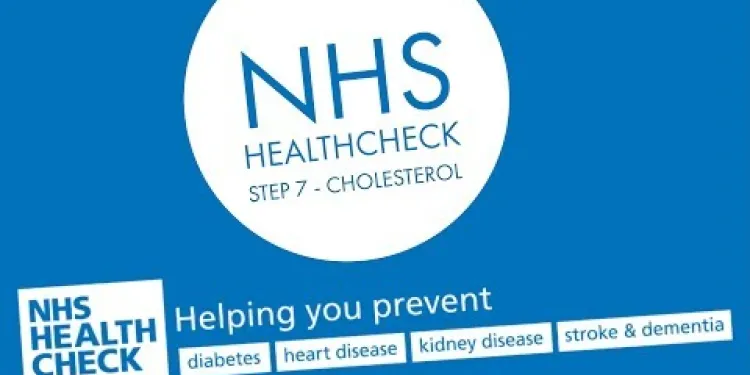
Find Help
More Items From Ergsy search
-

Ask for a prostate specific antigen (PSA) test along with your annual cholesterol check.
Relevance: 100%
-

Prostate Specific Antigen (PSA) test
Relevance: 79%
-

What are PSA levels? - Prostate Cancer
Relevance: 53%
-

What is PSA testing?
Relevance: 52%
-

Prostate cancer diagnosis and tests
Relevance: 46%
-

What is the importance of PSA levels in treatment?
Relevance: 42%
-

NHS Health check - Cholesterol
Relevance: 39%
-

What is Prostate Cancer?
Relevance: 34%
-

Does BPH increase the risk of prostate cancer?
Relevance: 34%
-

Treating prostate cancer
Relevance: 33%
-

Is BPH the same as prostate cancer?
Relevance: 33%
-

How often should cholesterol levels be tested when taking heart disease medication?
Relevance: 33%
-

Can prostate cancer recur after treatment?
Relevance: 33%
-

What is active surveillance in prostate cancer treatment?
Relevance: 32%
-

Living with prostate cancer
Relevance: 31%
-

Prostate cancer symptoms - detecting them early
Relevance: 31%
-

What is the prostate gland's role in the body?
Relevance: 30%
-

Harshi’s learning disability annual health check and health action plan
Relevance: 30%
-

How is prostate cancer treated?
Relevance: 27%
-

what is benign prostate hyperplasia (non-cancerous)?
Relevance: 27%
-

What is the purpose of a bone scan in prostate cancer treatment?
Relevance: 26%
-

Why do men get prostate cancer?
Relevance: 26%
-

Am I more at risk of prostate cancer?
Relevance: 25%
-

Prostate Surgery
Relevance: 24%
-

Is focal therapy an option for prostate cancer?
Relevance: 24%
-

What kinds of cancer screening are available?
Relevance: 24%
-

What is it like having Prostate Radiotherapy treatment?
Relevance: 23%
-

Are there specific vegetables that are more effective against prostate cancer?
Relevance: 23%
-

What type of research supports the role of diet in prostate cancer management?
Relevance: 22%
-

What is the annual CGT allowance?
Relevance: 22%
-

Can I access prostate cancer information online through the NHS?
Relevance: 22%
-

What is benign prostatic hyperplasia (BPH)?
Relevance: 22%
-

What is the role of immunotherapy in prostate cancer treatment?
Relevance: 22%
-

What factors determine the treatment plan for prostate cancer?
Relevance: 21%
-

Can fiber help lower cholesterol levels?
Relevance: 21%
-

How does cryotherapy work in treating prostate cancer?
Relevance: 21%
-

Can prostate cancer be treated with targeted therapy?
Relevance: 20%
-
Do new variants affect COVID-19 testing?
Relevance: 20%
-

Can I check the waiting time for a specific procedure online?
Relevance: 20%
-

What is the difference between single-trip and annual holiday insurance?
Relevance: 20%
Understanding the Importance of PSA Testing
In the United Kingdom, taking charge of one's health is a priority for many individuals, particularly as they age. Among the essential tests that men should consider as part of their routine health checks is the Prostate-Specific Antigen (PSA) test. This test, a crucial marker for prostate health, can be easily requested alongside your annual cholesterol check. By understanding the importance of PSA testing and how it complements other health assessments, men can ensure a comprehensive evaluation of their well-being.
What is a PSA Test?
The Prostate-Specific Antigen test is a blood test that measures the level of PSA in the bloodstream. PSA is a protein produced by both cancerous and non-cancerous tissue in the prostate, a small gland that sits below a man’s bladder. Elevated levels of PSA can be an indication of prostate cancer, although they can also signify benign prostate conditions or infections. As there are no symptoms in the early stages of prostate cancer, a PSA test can be a vital tool in early detection, offering a window of opportunity for early and often more effective treatment.
Coordinating PSA Testing with Annual Cholesterol Checks
Many men include a cholesterol check as part of their annual health assessment to manage cardiovascular health. By coordinating this annual visit with a PSA test, men can efficiently address two critical aspects of their health with one appointment. Discussing this test with your GP during your visit can lead to an informed decision about whether PSA screening is appropriate for you, based on factors such as age, family history, and any urinary symptoms you might be experiencing. The convenience of combined testing can ensure more comprehensive care.
Engaging in Proactive Health Care
In the UK, the accessibility of medical advice through the NHS means that discussing concerns openly with your GP is straightforward. Engaging in a proactive approach to health care by requesting a PSA test enables men to maintain control over their health outcomes. Early detection through regular screening can significantly impact the management and treatment of potential issues, thereby enhancing the quality and longevity of life. Remember to discuss your health history and any potential risk factors with your healthcare provider to optimize your testing decisions.
Understanding Why PSA Testing is Important
In the UK, many people take charge of their health, especially as they get older. For men, an important test to think about is the PSA test, which helps check prostate health. This test can be done easily when you also check your cholesterol each year. Knowing why the PSA test is important and how it helps with other health checks means men can look after their health better.
What is a PSA Test?
A PSA test is a blood test. It looks at the amount of PSA, a protein, in the blood. The prostate, a small gland below a man's bladder, makes PSA. High PSA levels might mean prostate cancer, but they can also happen due to other prostate issues or infections. Because you don't feel symptoms early on in prostate cancer, the PSA test helps find problems early, so treatment can start sooner and work better.
Doing PSA Testing with Yearly Cholesterol Checks
Many men check their cholesterol every year to keep their heart healthy. By doing a PSA test at the same time, men can check two important health areas in one visit. Talk to your doctor about the PSA test during this visit. They can help you decide if you need it based on your age, family history, and any problems going to the toilet. Doing these tests together makes taking care of your health easier.
Being Active in Health Care
In the UK, it's easy to talk to your doctor because of the NHS. Asking for a PSA test is a good way to stay in control of your health. Finding problems early through regular PSA checks can really help in taking care of any issues. It can make life better and longer. Remember to talk to your doctor about your past health and any risks to make the best choices for your tests.
Frequently Asked Questions
What is a prostate-specific antigen (PSA) test?
A prostate-specific antigen (PSA) test is a blood test used to measure the level of PSA in the blood, which can be an indicator of prostate cancer or other prostate-related conditions.
Why should I consider having a PSA test?
You might consider a PSA test if you are experiencing symptoms related to prostate problems, have a family history of prostate cancer, or as part of a regular health check-up if recommended by your GP.
At what age should I start considering a PSA test?
In the UK, men are generally advised to discuss the need for a PSA test with their GP starting at age 50, or earlier if they have a higher risk due to family history or other factors.
How is a PSA test performed?
The PSA test is a simple blood test. A sample of blood is taken, usually from your arm, and sent to a lab for analysis.
Are there any risks associated with a PSA test?
The PSA test itself has minimal risks, but false positives or negatives can occur, which may lead to unnecessary additional testing or missed diagnoses.
How should I prepare for a PSA test?
You may be advised to avoid ejaculation and vigorous exercise for 48 hours before the test, as they can temporarily elevate PSA levels. Always follow specific advice from your GP.
What do PSA test results mean?
Higher PSA levels might indicate prostate cancer or other conditions such as an enlarged prostate or prostatitis. Further tests are often needed to confirm any diagnosis.
Can a PSA test detect all prostate issues?
No, the PSA test alone cannot detect all prostate issues. It is usually used in conjunction with other diagnostics like a digital rectal exam or imaging tests.
Does a high PSA level always mean cancer?
No, high PSA levels can be caused by non-cancerous conditions like an enlarged prostate or prostatitis. Further investigation is necessary to determine the cause.
Can anything affect my PSA levels?
Yes, factors such as age, prostate enlargement, urinary tract infections, medications, and even recent ejaculation or exercise can affect PSA levels.
Is a PSA test available on the NHS?
Yes, PSA tests can be arranged by your GP on the NHS if they believe it is necessary based on your symptoms and risk factors.
What happens if my PSA levels are high?
If your PSA levels are high, your GP may recommend additional tests such as further blood tests, imaging, or a biopsy to determine the cause.
How often should I have a PSA test?
The frequency of PSA tests should be based on individual risk factors and in consultation with your GP. Regular screening is not recommended for everyone.
Can lifestyle changes affect PSA levels?
Yes, lifestyle changes like diet and exercise may impact PSA levels, but it is important to follow medical advice tailored to your specific health needs.
Should I have a PSA test along with my cholesterol check?
Discuss with your GP whether having a PSA test alongside your annual cholesterol check is appropriate based on your health status and risk factors.
What is a PSA test?
A PSA test is a simple blood test.
It checks for a special substance made by the prostate.
Doctors use this test to look for signs of problems with the prostate.
If you want help, ask a nurse or doctor.
You can also use drawings or videos to understand it better.
A PSA test is a type of blood test. It checks how much of a thing called PSA is in the blood. This can help doctors see if there might be a problem with the prostate, like prostate cancer.
Why should I think about having a PSA test?
A PSA test is a medical check. It looks at the health of your prostate, a part inside your body. It helps doctors see if everything is okay.
Here are some reasons why you might have a PSA test:
- Check Health: The test shows if your prostate is healthy or needs more care.
- Find Problems Early: It can help find any problems early, so it's easier to treat them.
- Talk to Your Doctor: It's a good chance to talk to your doctor about health.
If you're unsure, ask your doctor to explain why it might be good for you.
It's okay to ask questions. Bring a friend or family member to help if you want.
You might think about having a PSA test if:
- You are having trouble with your prostate, like needing to pee a lot.
- Someone in your family had prostate cancer before.
- Your doctor says it's a good idea to check as part of staying healthy.
There are some helpful ways to learn and understand more:
- Ask your doctor lots of questions.
- Use simple books or videos about health.
- Talk to someone you trust who's good at explaining things.
When should I think about having a PSA test?
In the UK, men are usually told to talk to their doctor about a PSA test when they turn 50. If they have a family history or other reasons that might put them at risk, they might need to start earlier.
It can be helpful to use a calendar or a reminder on your phone to remember when to have this talk with your doctor.
How do you get a PSA test?
A PSA test is a simple blood test. Here's how it works:
- You go to the doctor or a nurse.
- They clean your arm with a small wipe.
- They use a small needle to take some blood from your arm.
- You might feel a little pinch, but it's quick.
- They send the blood to a lab to look at it.
Here are some tips to help you:
- Take slow, deep breaths to stay calm.
- Bring a friend or family member if you want support.
- Ask the doctor any questions you have.
The PSA test is a simple blood test. A nurse or doctor will take some blood from your arm and send it to a lab to check it.
Are there any risks with a PSA test?
The PSA test is mostly safe, but it can sometimes give wrong results. This could mean that people have extra tests they do not need or that a problem is missed.
Getting Ready for a PSA Test
Here is how you can get ready for a PSA test:
- Ask someone you trust to explain the test. This could be a family member, friend, or healthcare worker.
- Write down any questions you have. Bring them with you to ask the doctor.
- Try to stay calm. Deep breaths can help if you feel worried.
You can use pictures or videos that explain PSA tests. These can help you understand better.
Your doctor might tell you not to have sex or do hard exercise for 2 days before the test. This is because they can make PSA levels go up for a short time. Make sure to listen to what your doctor says.
What Do PSA Test Results Mean?
A PSA test checks for a protein in your blood. This protein is called PSA.
The test can help doctors see if there might be a problem with your prostate.
If your PSA number is high, it might mean there is a problem with your prostate.
If your PSA number is low, your prostate is probably healthy.
Always talk to your doctor to understand what your test result means.
You can use tools like audio readers to understand better.
High PSA levels can mean prostate cancer. But it can also mean you have a big prostate or swelling in the prostate. Doctors will need to do more tests to know for sure.
Helpful Tip: If this is hard to read, try using a text-to-speech tool to listen to the words. Look for simple videos or pictures online to understand better.
Can a PSA test find all prostate problems?
A PSA test is a blood test. It helps doctors check for problems with your prostate. The prostate is a small gland in men.
A PSA test does not find all prostate problems. It is just one way to check.
If you have any questions, it's good to talk to your doctor. They can help explain what the PSA test shows.
Tools like pictures or videos might help you understand better. You can also ask for more time to talk about it.
No, the PSA test by itself cannot find all prostate problems. It is usually used with other checks like a digital rectal exam or imaging tests.
Does a high PSA level always mean cancer?
PSA is a short way to say "Prostate-Specific Antigen." It is something made by the prostate, a part of the body only men have.
It is important to know that having a high PSA level does not always mean a person has cancer. There are other reasons for a high PSA, like getting older or having an infection.
If someone has a high PSA level, it is important to see a doctor. The doctor can do more tests to find out what is going on.
If it is hard to read or understand medical words, it can help to have someone read it with you or ask a doctor or nurse to explain.
No, a high PSA level does not always mean cancer. It could be something else, like a bigger prostate or an inflamed prostate. Doctors need to do more tests to find out what's really going on.
Can anything change my PSA levels?
Yes, some things can make your PSA levels go up or down. PSA is something your body makes. It helps doctors know how healthy your prostate is.
Here are some things that can change PSA levels:
- If you ride a bike or do a lot of exercise.
- If you have an infection or your prostate is swollen.
- If you just had a test or an operation on your prostate.
- If you take some medicines.
If you have questions, talk to your doctor. They can help you understand your PSA levels.
Here are some tools that can help you learn more:
- Use simple charts or drawings.
- Ask someone to explain it to you using easy words.
- Watch videos that explain PSA levels in a simple way.
Yes, many things can change PSA levels. These include how old you are, if your prostate is bigger, if you have an infection in your pee, some medicines, or even if you just had sex or exercised.
Helpful tools or tricks:
- If some words are hard, use a dictionary or ask someone to help explain.
- Take breaks if the reading feels too much.
Can you get a PSA test from the NHS?
You can get a PSA test from the NHS. A PSA test is a blood test for men. It helps check the health of your prostate.
Ask your doctor for more information. They can help you decide if you need the test.
Here are some ways to get help:
- Ask someone to go to the doctor with you.
- Use a notebook to write down questions.
- Use pictures to help understand the test.
Yes, your doctor can organize a PSA test for you if they think you need it. They will decide this based on your symptoms and any risks you might have.
What does it mean if my PSA levels are high?
If your PSA levels are high, it means there is more of a substance called PSA in your blood. PSA stands for Prostate-Specific Antigen.
Having high PSA levels can mean different things. It might be a sign of something like an infection or an enlarged prostate. It can also be a sign of prostate cancer. But high PSA levels do not always mean you have cancer.
If your PSA levels are high, your doctor will talk to you about what it means. They may do more tests to find out why your PSA levels are high.
To help understand this, you can use tools like pictures, charts, or ask someone to explain it in a simple way. You can also ask your doctor to explain using easy words.
If your PSA levels are high, your doctor might ask you to have more tests. These could be more blood tests, special pictures of inside your body, or taking a small piece of tissue to look at it closely. This helps them find out what's going on.
How often should I have a PSA test?
Here is a simple way to understand when to have a PSA test:
- A PSA test checks for health issues with your prostate.
- Ask your doctor when you should have the test.
- Your age and health can change how often you need it.
- Some people need the test every year.
- Others might need it less often.
If you need help understanding this, you can:
- Ask someone you trust to explain it to you.
- Use drawings or pictures to help you understand.
- Write down questions you have before seeing the doctor.
How often you have a PSA test depends on your own health needs. It is important to talk to your doctor about it. Not everyone needs to have these tests all the time.
Can changing how you live change your PSA levels?
PSA is something in the blood doctors check for prostate health.
Making some changes in your daily life might help with PSA levels. This includes:
- Eating healthy food: Try eating more fruits and veggies. They are good for your body.
- Exercise: Move your body every day, like walking or playing.
- No smoking: Smoking can be bad for your health, and quitting can help.
- Less alcohol: Try to drink less alcohol, like beer or wine.
If you find reading difficult, here are some tips:
- Ask someone to read it with you.
- Use a finger or ruler to follow the words.
- Read slowly and take your time.
Changing little things in how you live might help keep you healthy.
Yes, changing the way you eat and do exercise can change PSA levels. But it's important to listen to your doctor and do what they say is best for your health.
Should I get a PSA test when I have my cholesterol checked?
If you are thinking about having a PSA test, it is a good idea to talk to your doctor. They can help you decide what is best for your health.
A PSA test checks for signs of prostate problems. Men often have this test as they get older.
A cholesterol test checks the fats in your blood. It is important for your heart health.
Here are some tips to help you:
- Ask your doctor if a PSA test is right for you.
- Write down any questions you have before your appointment.
- Bring someone with you to your doctor visit. They can help you remember what the doctor says.
- Use a notebook to keep track of your test results.
Talk to your doctor about if it is a good idea to have a PSA test when you get your yearly cholesterol check. This depends on your health and any risks you might have.
Useful Links
This website offers general information and is not a substitute for professional advice.
Always seek guidance from qualified professionals.
If you have any medical concerns or need urgent help, contact a healthcare professional or emergency services immediately.
Some of this content was generated with AI assistance. We’ve done our best to keep it accurate, helpful, and human-friendly.
- Ergsy carfully checks the information in the videos we provide here.
- Videos shown by Youtube after a video has completed, have NOT been reviewed by ERGSY.
- To view, click the arrow in centre of video.
- Most of the videos you find here will have subtitles and/or closed captions available.
- You may need to turn these on, and choose your preferred language.
- Go to the video you'd like to watch.
- If closed captions (CC) are available, settings will be visible on the bottom right of the video player.
- To turn on Captions, click settings .
- To turn off Captions, click settings again.
More Items From Ergsy search
-

Ask for a prostate specific antigen (PSA) test along with your annual cholesterol check.
Relevance: 100%
-

Prostate Specific Antigen (PSA) test
Relevance: 79%
-

What are PSA levels? - Prostate Cancer
Relevance: 53%
-

What is PSA testing?
Relevance: 52%
-

Prostate cancer diagnosis and tests
Relevance: 46%
-

What is the importance of PSA levels in treatment?
Relevance: 42%
-

NHS Health check - Cholesterol
Relevance: 39%
-

What is Prostate Cancer?
Relevance: 34%
-

Does BPH increase the risk of prostate cancer?
Relevance: 34%
-

Treating prostate cancer
Relevance: 33%
-

Is BPH the same as prostate cancer?
Relevance: 33%
-

How often should cholesterol levels be tested when taking heart disease medication?
Relevance: 33%
-

Can prostate cancer recur after treatment?
Relevance: 33%
-

What is active surveillance in prostate cancer treatment?
Relevance: 32%
-

Living with prostate cancer
Relevance: 31%
-

Prostate cancer symptoms - detecting them early
Relevance: 31%
-

What is the prostate gland's role in the body?
Relevance: 30%
-

Harshi’s learning disability annual health check and health action plan
Relevance: 30%
-

How is prostate cancer treated?
Relevance: 27%
-

what is benign prostate hyperplasia (non-cancerous)?
Relevance: 27%
-

What is the purpose of a bone scan in prostate cancer treatment?
Relevance: 26%
-

Why do men get prostate cancer?
Relevance: 26%
-

Am I more at risk of prostate cancer?
Relevance: 25%
-

Prostate Surgery
Relevance: 24%
-

Is focal therapy an option for prostate cancer?
Relevance: 24%
-

What kinds of cancer screening are available?
Relevance: 24%
-

What is it like having Prostate Radiotherapy treatment?
Relevance: 23%
-

Are there specific vegetables that are more effective against prostate cancer?
Relevance: 23%
-

What type of research supports the role of diet in prostate cancer management?
Relevance: 22%
-

What is the annual CGT allowance?
Relevance: 22%
-

Can I access prostate cancer information online through the NHS?
Relevance: 22%
-

What is benign prostatic hyperplasia (BPH)?
Relevance: 22%
-

What is the role of immunotherapy in prostate cancer treatment?
Relevance: 22%
-

What factors determine the treatment plan for prostate cancer?
Relevance: 21%
-

Can fiber help lower cholesterol levels?
Relevance: 21%
-

How does cryotherapy work in treating prostate cancer?
Relevance: 21%
-

Can prostate cancer be treated with targeted therapy?
Relevance: 20%
-
Do new variants affect COVID-19 testing?
Relevance: 20%
-

Can I check the waiting time for a specific procedure online?
Relevance: 20%
-

What is the difference between single-trip and annual holiday insurance?
Relevance: 20%


